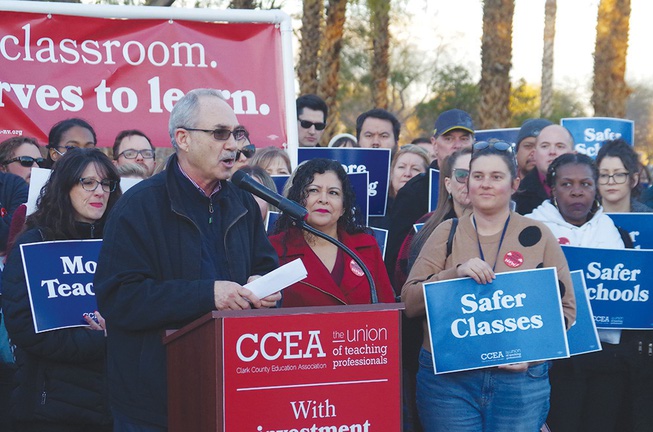
Hillary Davis
John Vellardita, executive director of the Clark County Education Association, leads a rally Monday, Feb. 6, 2023, outside the Grant Sawyer State Office Building in Las Vegas. Members of the state’s largest teachers union rallied for increased funding for Nevada public schools on what was the first day of the Nevada Legislature’s 2023 session.
Monday, Aug. 21, 2023 | 5:21 p.m.
The Clark County School District’s teachers union today filed a motion to dismiss the district’s request for an injunction preventing a strike on the grounds that CCSD’s lawsuit is an attempt to limit the union’s rights to free speech.
CCSD sued Clark County Education Association in Clark County District Court on July 31, citing comments made by union leaders and members that “work actions,” as CCEA Executive Director John Vellardita has phrased them, are possible if the union does not have a new contract by Saturday, Aug. 26.
CCSD interpreted these and other statements made in news and social media as a threat to strike, which is illegal in Nevada for employees of local and state governments.
In its filing today, CCEA argued that “no one could have believed a teachers’ strike was imminent on July 31… or that one is imminent now.”
It’s a tactic that leans on Nevada’s anti-SLAPP law, meaning “Strategic Lawsuits Against Public Participation.” Anti-SLAPP motions, the union argued, “protect the exercise of fundamental speech rights against meritless and retaliatory suits like the one in question.”
The motion landed less than 24 hours before a hearing before a judge who is to consider CCSD’s request to block a strike, and three days after the latest, unsuccessful bargaining sessions between the union and the district.
Over the last three weeks, the district and the union have filed legal documents arguing that a strike is — or is not — imminent.
CCEA says that officials have repeatedly expressed in public that strikes are illegal, and that union leadership has used conditional language about “work actions” that union members have yet to vote on.
CCSD says the union is flagrantly threatening a strike to get the district to acquiesce to its contract demands that include, among other provisions, 18% across-the-board raises.
State law prevents strikes, and threats of strikes, by public employees, and the law defines “strike” broadly.
The law prohibits “stoppage of work … (a)bsence from work by employees … upon any pretext or excuse, such as illness, which is not founded in fact; or … (i)nterruption of the operations of the State of Nevada or any local government employer by an employee organization or labor organization.”
In a filing last week, CCSD pointed to union-led disruptions at the Aug. 10 School Board meeting in claiming the union has already interrupted district operations.
The union drew several hundred members to demonstrate outside the meeting, which CCSD has told the court it did not take issue with. However, the board left the meeting room twice after several dozen members who packed the room loudly chanted slogans like “no contract, no peace” and “CCSD is on fire,” which the district argued they coordinated solely to disrupt the district’s business.
Although the union’s filing today did not reference the Aug. 10 demonstrations, it says member and leadership statements elsewhere are “protected speech in furtherance of an issue of public concern.”
“In its lawsuit and subsequent motions, however, not only does the district fail to point to any actual evidence supporting such a finding — no strike vote, no strike resolution, no conduct supporting strike activity of any kind — its case is undermined entirely by its own arguments,” the document said. “The complaint… points to press interviews or statements that in no way establish the imminence of a teachers’ strike, such that this court has to act to forestall immediate and impending harm. This lawsuit was filed on July 31; it is now Aug. 22, and no strike has materialized, and is no more threatened now than it was when the district filed it.”
